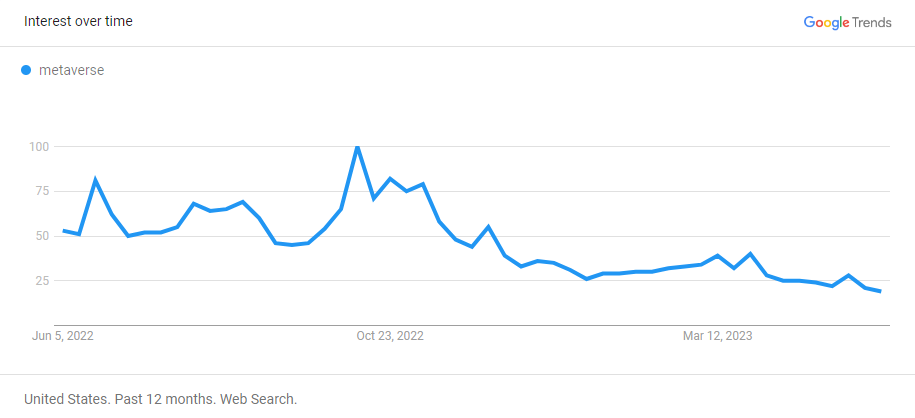The metaverse could be considered the buzzword of 2022, given the interest it is generating both at the consumer level and in the B2B sector.
Especially in the B2B world, we could say, as most players in the digital world are trying to capture a share of this rapidly growing market.
However, not all opinions have the same value and just like with any topic, some deeply understand the industry, its technical and social issues, and those who simply express an opinion, are not necessarily supported by facts.
We have selected ten individuals we believe are worth following for interesting and thought-provoking insights into how the metaverse concept will evolve.

TONY PARISI
Tony Parisi is one of the most interesting voices in the field of virtual reality, the metaverse, and everything surrounding it. He held the position of Global Head of AR/VR Ads and E-Commerce at and has been deeply involved in exploring these technologies.
Alongside Mark Pesce, he was the creator of VRML (Virtual Reality Markup Language) in 1994, the first standard for representing 3D objects and scenes on the web through a browser, later replaced by the more recent X3D. He is undeniably one of the early pioneers of VR, someone who did not give up when the initial hype in the 90s faded.
Currently, Parisi is active primarily on Medium, where he publishes his thoughts on the current state of VR and the underlying technologies of the metaverse.
ARTUR SYCHOV
Artur Sychov is an eclectic figure. He founded (and is the current CEO of) Somnium Space, one of the leading virtual reality platforms.
Unlike many who only talk about VR, Artur is one of the few individuals who actually create and actively use metaverses, not just for entertainment purposes.
For example, during a TEDx event on September 18th, he delivered his speech wearing a Teslasuit and a VR headset, connecting the in-person audience with the audience experiencing the conference in his virtual world, Somnium Space, as mentioned before.
This was not merely a way to impress the audience: Artur firmly believes that within 10 years, many individuals will spend the majority of their time in the metaverse, a technology that he believes will become as pervasive as smartphones. We can follow him on LinkedIn and Twitter, but it’s also worth keeping an eye on Somnium Times, a news and articles portal related to the world of virtual reality, featuring contributions from numerous industry specialists.
CHARLIE FINK
Author, journalist, producer, metaverse consultant, Disney executive… Charlie Fink is a multifaceted individual who enjoys exploring various fields and telling stories. He was responsible for the development of the famous Disney animated film, The Lion King when he served as Vice President of Walt Disney Pictures. After working in animation, he transitioned to the technology industry, becoming the Vice President of America Online in 1996.
In the 2000s, he focused on music and theater as the Artistic Director of the New Musical Foundation. In essence, we are talking about someone who has a deep understanding of the business world but also embraces his nerdy side. He has authored two books on the metaverse: “Charlie Fink’s Metaverse, Convergence, How The World Will Be Painted With Data” and “Remote Collaboration & Virtual Conferencing: The Future of Work.”
Currently, he is a columnist for Forbes, where he discusses topics related to VR and AR. In addition to the well-known magazine, we can follow him on his website, although it has
CATHY HACKL
Cathy Hackl, CEO of Futures Intelligence Group, a company that helps businesses position their brands in virtual worlds, has been dubbed the Godmother of the metaverse.
And we’re not talking about small companies here, as her clients include giants like Clinique Laboratories, a US cosmetics company, and Procter & Gamble. She specializes in communication but is also well-versed in technology, especially in the VR field. She has worked as an enterprise strategist for HTC Vive and Magic Leap.
Today, in addition to being the number one at Futures Intelligence Group, she publishes articles in the Wall Street Journal, Forbes, Wired, and LinkedIn. In 2020, Big Think named her one of the 10 most influential women in the tech world. She hosts a popular podcast called Future Insiders and is very active on LinkedIn, where she has over 100,000 followers. However, her website hasn’t been updated for a few months.
PHILIP ROSEDALE
Who could know the metaverse better than the creator of the first shared virtual world (excluding video games)? If we want to delve into the topic of virtual worlds, we cannot ignore the vision of Philip Rosedale, the founder of Second Life. He now works for High Fidelity, of which he is a co-founder, a company specializing in spatial audio technologies for standalone applications and the web. High Fidelity’s clients include Clubhouse, and after taking a break from Second Life professionally, Rosedale has returned to collaborate with Linden Lab, the company that operates the first virtual world, with the goal of making the platform a leading player in the metaverse again.
Unlike other figures, he is less active on the web, but we can follow his sporadic updates on Twitter and LinkedIn.
ALVIN WANG GRAYLIN
Among the many voices in the metaverse, Alvin Wang Graylin’s voice is one of the most influential, simply because he is the president of HTC in China, the company that produces the Vive headset. He is also the president of the Virtual Reality Venture Capital Alliance (VRVCA), an organization established in 2016 with the aim of identifying the most innovative technologies in the VR field.
He is a knowledgeable person in the technology field and has a comprehensive view of the industry from a business perspective. He frequently publishes interesting reflections on the virtual reality industry, with a particular focus on the Chinese market, on LinkedIn and Twitter.
TOM EMRICH
Suppose there is one person to follow in the field of augmented reality. In that case, it is Tom Emrich, who manages the products and marketing for his startup 8th Wall, which is owned by Niantic. This California-based company created the first successful multiplayer AR application, Ingress, and later Pokémon Go.
8th Wall is not a virtual world but a platform that provides developers with all the necessary tools to create augmented reality applications. We can follow his insights on his website and, of course, on LinkedIn and Twitter.
KAVYA PEARLMAN
The metaverse reflects the real world, for better or worse. It didn’t take long after the debut of Horizon to see the first cases of virtual harassment. A girl was approached by three individuals who started “bothering” her.
In the absence of physical contact, it’s certainly difficult to talk about violence, but what happened highlights the need to address the issue. Kavya Pearlman, known as the Cyber Guardian, founded the XR Safety Initiative (XRSI) for this purpose, an organization that promotes the development of standards and guidelines to ensure safety, privacy, and ethical values even in virtual worlds. We can read her opinions on LinkedIn, the channel she updates most frequently. She also has a Twitter profile, although it hasn’t been updated for almost a year.
DAVID MARCUS
One of the distinctive features of the metaverse, as well as one of the main challenges, is the integration of an economic system, and many companies are working on this front, leveraging rapidly emerging technologies such as crypto, blockchain, and NFTs. We are still far from a shared, secure, and effective solution, but this is one of the key goals.
One prominent figure in this regard is David Marcus, a seasoned expert in the fintech world. He served as the President of PayPal and Vice President of Messaging Products at Facebook. Until 2018, he was on the Board of Directors of Coinbase, and more recently, he was in charge of Calibra (previously known as Libra), the cryptocurrency being developed by the social media giant.
He left Zuckerberg’s company at the end of 2021 and is taking a break. As a result, he has reduced his frequency of posts on LinkedIn but remains quite active on Twitter.
MARK ZUCKERBERG
We saved Zuckerberg for last, not because he is the least representative, but quite the opposite. The founder of Facebook/Meta was the first to give a powerful boost to virtual reality, first by acquiring Oculus from Palmer Luckey, which at the time was little more than a successful project on Kickstarter, and then by leveraging the vast economic and technological resources of Facebook to create the conditions for bringing the metaverse to life.
Zuckerberg’s vision, moreover, is the most ambitious one, involving the use of virtual reality hardware to live in the virtual world. In short, Zuckerberg controls one of the companies that produce headsets for the metaverse and has the technological expertise and economic resources to propel his platform forward.
Not only that, but he also has a long-term vision for the economic system that could underpin the metaverse. His project to create the cryptocurrency Diem (formerly known as Libra) failed in January 2022 due to regulatory issues, but it’s not unlikely that the concept will be revisited and improved. The best place to follow him? Naturally, his Facebook account was followed by a whopping 119 million people.



